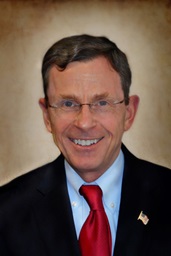Key Points:
- McKendree United Methodist Church in downtown Nashville, Tennessee, was the starting point of a large rally April 17 in favor of stricter gun laws.
- The “Moral Monday” event was organized by Repairers of the Breach, a social justice organization based in Goldsboro, North Carolina, headed by the Rev. William Barber II.
- The protest coincided with a bill moving through the Tennessee General Assembly to allow teachers with training to be armed in schools.
Upward of a thousand protestors, including United Methodist clergy and laity, spent a sunny spring afternoon downtown reliving the dark morning of a deadly school shooting, and pledged to keep pushing for more gun control.
“The last three weeks have been deeply painful,” said Sarah Neumann, whose 5-year-old child survived the March 27 mass shooting at The Covenant School. “Our days are spent hearing children as young as 3 years old describe in horrific detail what they saw and heard. Third-graders saw the dead bodies of their friends, not just coffins.”
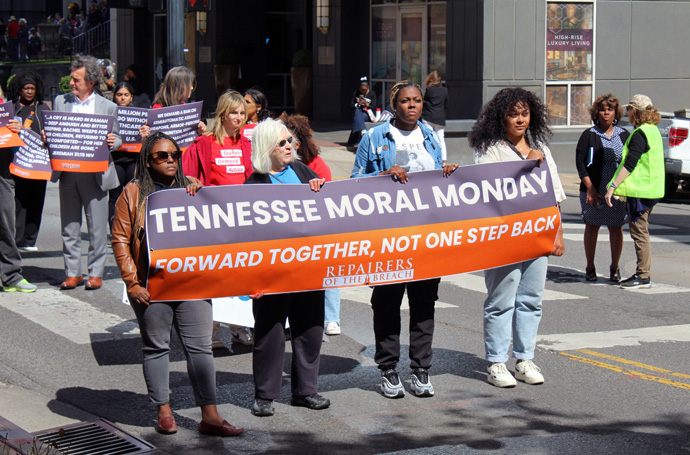
Five caskets and an urn were marched April 17 from McKendree United Methodist Church to the Tennessee State Capitol, one for each victim of the assault. A crowd big enough to fill the expansive War Memorial Plaza heard speakers like Neumann exhort them to not let their anger dissipate.
Neumann described the “sorrowing wails” of a mother whose child was killed in the Covenant shooting.
“I worked in pediatric oncology for 13 years,” she said. “I held kids in my arms as they died way too many times. Nothing compared to the scream of that mom.”
United Methodists were well represented at the “Moral Monday” rally, where the crowd was diverse in age, race and faith.
“First of all, I'm here because I'm a preschool teacher,” said Anna Voorhees, who works at the daycare of West End United Methodist Church. “The day after Covenant, my school received a threat, and I had to think about the fact that in a situation where somebody gets into our buildings, the only way to escape is to lift my babies out of a window. It's terrifying.”
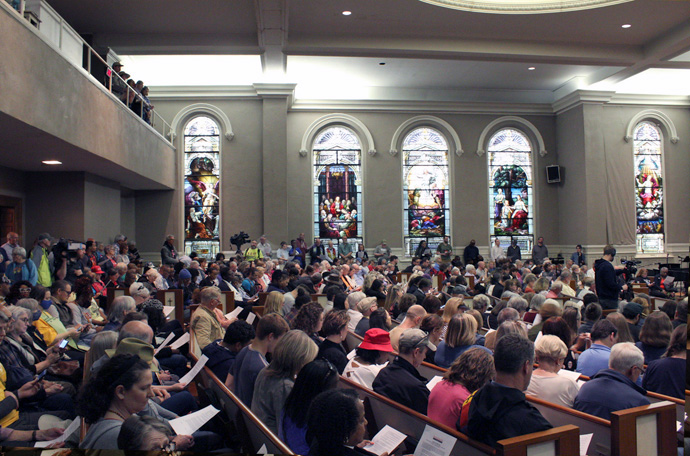
Events have moved rapidly in the aftermath of the murders of Evelyn Dieckhaus, 9; Mike Hill, 61; William Kinney, 9; Katherine Koonce, 60; Cynthia Peak, 61; and Hallie Scruggs, 9. The shooter, 28-year-old Audrey Hale, was killed at the scene.
On April 6, two state lawmakers, Rep. Justin Jones, D-Nashville, and Rep. Justin Pearson, D-Memphis, were expelled from the state legislature for disrupting a session by leading chants for gun reform with a bullhorn on the chamber floor. A third lawmaker, Rep. Gloria Johnson, D-Knoxville, escaped being expelled by one vote. She is white, and the two expelled lawmakers are Black. Jones and Pearson have subsequently been reinstated as interim legislators but will have to run for their seats again in a special election.
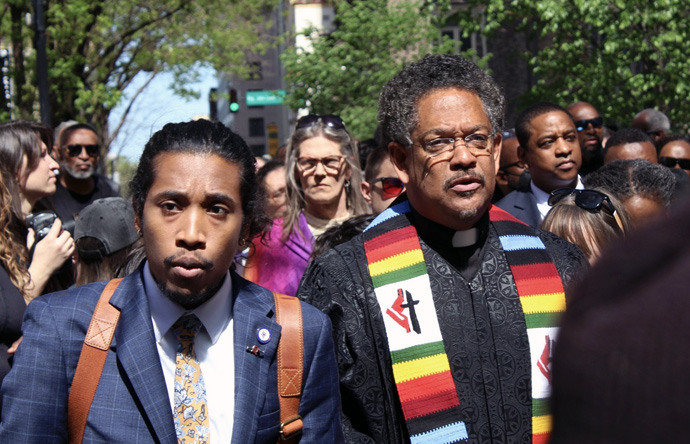
The April 17 protest was organized by Repairers of the Breach, a North Carolina social justice organization headed by the Rev. William Barber II. The shooting and its aftermath have been followed closely by national media.
“Returning individuals to their duly elected seat does not solve the problem,” said Barber, president of Repairers of the Breach. “No, the past week's events have simply exposed the problem for all to see.”
Barber said gun control is intertwined with other issues that also need addressing.
“We recognize that the same people that blocked gun laws, blocked health care,” he said. “The same ones that blocked health care, blocked voting rights. And the same ones that blocked voting rights, blocked a living wage. And the same ones that blocked living wages, they blocked dealing with the environment.
“If they are cynical enough to be together, we got to be smart enough to come together and stay together.”
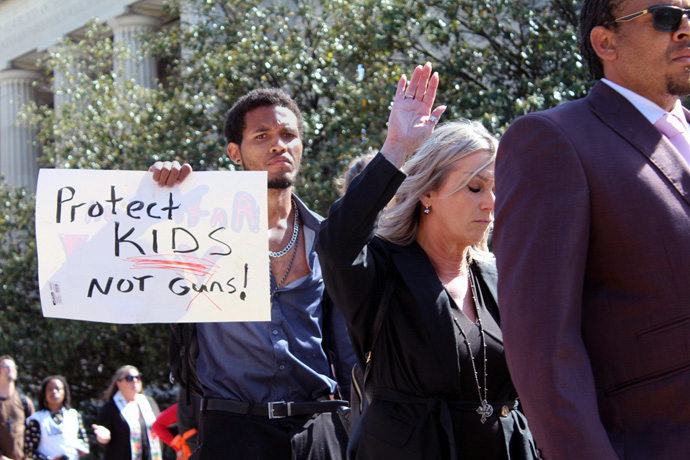
At one point at War Memorial Plaza, a Gospel singer led a chant of “Somebody’s baby is dying in this land, and we’ve got to set it right again.”
The Rev. Sam McGlothlin, senior pastor of Belle Meade United Methodist Church, said it’s time for people of faith to act.
“We have to hope, so we have to help,” she said. “We have to show up. We have to be present. We have to work for change. … If we sit on the sidelines, then we're saying there's no hope for anything to be different.
“We're people who believe in change and new life and resurrection, so we're bearing witness to it now.”
The Rev. John Feldhacker, senior pastor of Edgehill United Methodist Church, said state gun regulations need to be strengthened, but legislators are headed the opposite way.
The evening of the protest, the legislature was due to take up a bill allowing the arming of teachers in schools. The sponsor of the legislation, Rep. Ryan Williams, R-Cookeville, announced that he would move to have his bill “held on the desk” — an action that typically means that the legislation is spiked for the year, reported The Associated Press.
Subscribe to our
e-newsletter
“There is a need to get the attention of state legislators to the insanity around their idolatry of guns,” Feldhacker said. “It's a toxic relationship with guns, and logic doesn't seem to resonate with them.”
Feldhacker said the protest marked a “historic shift in the tides.”
“The leadership of the (state legislators) Justins and Gloria has empowered and energized the people. … I think the energy is going to continue because it's so clear that the intentions of the state legislature are to loosen gun regulations.”
Lezleigh Kleibrink attended the protest with a group from her church, Glendale United Methodist.
“I lost my brother to gun violence myself, and so I was extremely angry and hopeless, but then hopeful,” she said. “Because God manages to show up in the small situations, and you start to see glimpses of hope again, and something like this (rally) gives me hope that our voices will be heard.”
Joerg Rieger, a theology professor at Vanderbilt Divinity School, said he’s “hopeful about faith making a difference” and echoed Barber’s sentiment that faith and social justice are intertwined.
“I think we don't have an option,” Rieger said. “I grew up in Germany. What we learned in the Holocaust and afterwards about the Third Reich was that the church that's quiet when all these injustices are happening in their concentration camps … is quite the problem, because it silently, tacitly endorses what's going on.”
Maya, a 14-year-old student whose Episcopal priest father requested that her last name be withheld, left school early to participate in the protest.
“(The Covenant shooting) made me feel unsafe,” she said. “I think that nobody should have to feel that way, and being part of the action makes me feel better.
“I'm hoping that we get change soon.”
Patterson is a UM News reporter in Nashville, Tennessee. Contact him at 615-742-5470 or [email protected]. To read more United Methodist news, subscribe to the free Daily or Weekly Digests.



